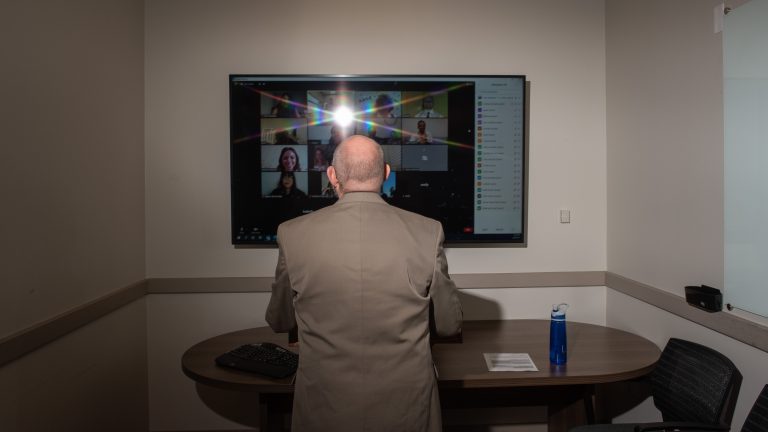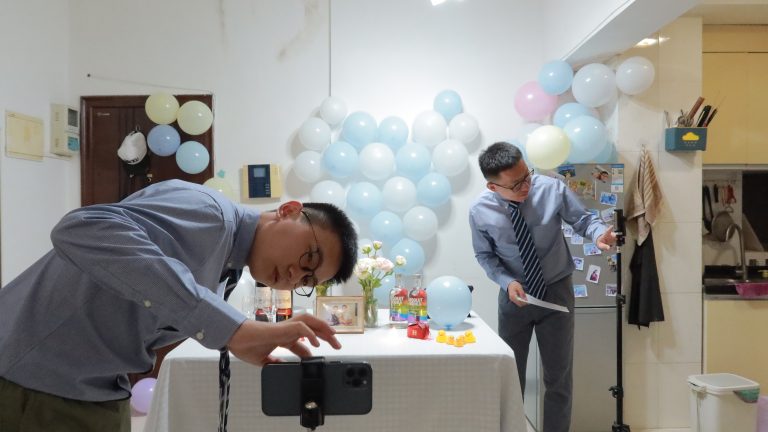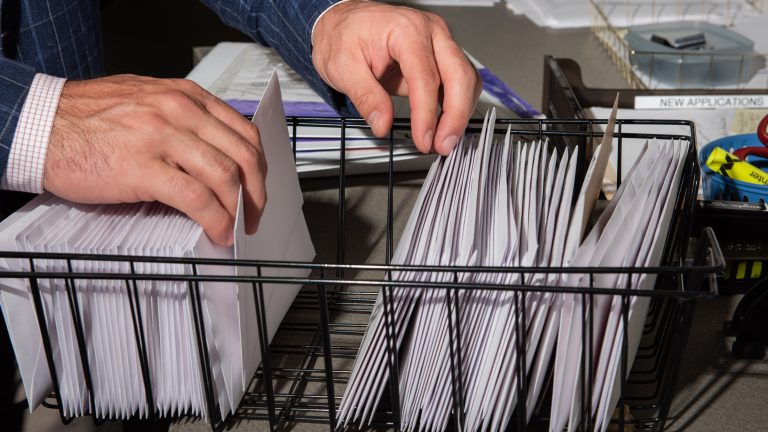Utah County introduced weddings over Zoom during the pandemic, unintentionally providing a valuable service for China's LGBTQ+ community.

A Utah County deputy clerk and team lead officiates a wedding ceremony over Zoom in Provo, Utah.
Russel Daniels
By VIOLA ZHOU
30 SEPTEMBER 2022
Xu Yanzhou and Zhu Xiaoming had a beautiful wedding. In front of flowers and candies, they exchanged vows reflecting on their five-year relationship, moving guests to tears. The pair put bangles on each other’s wrists. An officiant legally pronounced them husband and husband.
But little else was typical of a traditional Chinese wedding. The happy couple stood in their living room in Guangzhou, China, where same-sex marriage is illegal. The ceremony took place at midnight. And the officiant, appearing on Zoom, was in Utah.
“My first challenge to you is to choose each other each day and choose to be happy,” the 69-year-old officiant, Ben Frei, said in the video conference, as guests posted congratulatory messages in Chinese in the Zoom chat box. “You need to create your marriage … is somebody translating that?”
The state of Utah in the United States has no citizenship requirements for marriage licenses, and Utah County is the only place there that allows international couples to register their marriages online. Since the county rolled out virtual weddings during the Covid-19 pandemic, it became a wedding haven for same-sex couples who are not able to officially marry in their own countries.
As sexual minorities in China face suppression at home, Utah County is allowing them to officially marry and celebrate their love — all for around $100. Although the marriages aren’t recognized in China, some 200 same-sex couples from mainland China and Hong Kong have gotten married via the county’s digital marriage license system since 2021, wedding planners and county staff told Rest of World.
Sexual minorities struggle with discrimination and censorship in China. The country’s longest-running LGBTQ+ festival, Shanghai Pride, canceled its annual event indefinitely from 2020. Last year, messaging app WeChat shut down dozens of LGBTQ+ accounts. Queer content in films or TV shows often triggers censorship — related plot lines in Friends, Fantastic Beasts and Bohemian Rhapsody have been removed in China.
For authorities in Utah County, the influx of international couples came as a surprise. The Utah County and Auditor’s Office moved its marriage licensing service online, as part of a digitization initiative in 2019, Burt Harvey, a division manager who oversees public services and tax administration, told Rest of World. At the start of the pandemic, a number of couples requested Zoom ceremonies, and the county made those available as well. The service first attracted couples in Utah, followed by people from across the U.S., and later, from all over the world. From May 1 to September 20 this year, at least 77 same-sex couples with mainland Chinese addresses have been married there, said county deputy clerk Russ Rampton, who oversees marriage licensing, to Rest of World.
Xu and Zhu told Rest of World that they wanted to get married one day, but didn’t think it was worth traveling overseas. When they heard of a close friend getting married through a Zoom meeting in Utah, they decided to go for it. “It sounded very cheap and convenient,” said Xu, a tech product manager.
Kimberly Wang, the Europe-based founder of wedding-planning business Unlimited, told Rest of World that she has organized Zoom weddings for about 50 couples, mostly lesbian, since February. On Chinese social media, Wang advertises her business with coded language to avoid censorship of terms such as “same-sex” and “lesbian.” Most of her clients are in their late 20s to mid-30s, and live in big cities. Some wanted big online gatherings, Wang said, while others had secret ceremonies with no guests.
Liu Yangming married his husband Zhu Guangyu in a similar Zoom wedding in July. The couple, also in Guangzhou, had planned to marry on an overseas trip, but China’s strict zero-Covid policy made it difficult to leave (and re-enter) the country. Liu also told Rest of World that the couple worried about the future of same-sex marriages in the U.S., after the Supreme Court ended the constitutional right to abortion last June. They decided to get married right away via a virtual wedding with an officiant in Utah.
For the wedding, the couple decorated their living room with balloons, photos, and Absolut Rainbow Vodka. At the 1 a.m. ceremony, with tears in their eyes, the grooms recounted marching together for LGBTQ+ rights. Liu’s mother, watching via video call from another Chinese city, wished them a happy married life. A friend interpreted everything into English for the officiant. “It made our love stronger,” Liu told Rest of World, two months after their wedding. “My husband was talking more about our responsibilities. Before we would think we might break up some day, but now we can’t just break up.”

By VIOLA ZHOU
30 SEPTEMBER 2022
Xu Yanzhou and Zhu Xiaoming had a beautiful wedding. In front of flowers and candies, they exchanged vows reflecting on their five-year relationship, moving guests to tears. The pair put bangles on each other’s wrists. An officiant legally pronounced them husband and husband.
But little else was typical of a traditional Chinese wedding. The happy couple stood in their living room in Guangzhou, China, where same-sex marriage is illegal. The ceremony took place at midnight. And the officiant, appearing on Zoom, was in Utah.
“My first challenge to you is to choose each other each day and choose to be happy,” the 69-year-old officiant, Ben Frei, said in the video conference, as guests posted congratulatory messages in Chinese in the Zoom chat box. “You need to create your marriage … is somebody translating that?”
The state of Utah in the United States has no citizenship requirements for marriage licenses, and Utah County is the only place there that allows international couples to register their marriages online. Since the county rolled out virtual weddings during the Covid-19 pandemic, it became a wedding haven for same-sex couples who are not able to officially marry in their own countries.
As sexual minorities in China face suppression at home, Utah County is allowing them to officially marry and celebrate their love — all for around $100. Although the marriages aren’t recognized in China, some 200 same-sex couples from mainland China and Hong Kong have gotten married via the county’s digital marriage license system since 2021, wedding planners and county staff told Rest of World.
Sexual minorities struggle with discrimination and censorship in China. The country’s longest-running LGBTQ+ festival, Shanghai Pride, canceled its annual event indefinitely from 2020. Last year, messaging app WeChat shut down dozens of LGBTQ+ accounts. Queer content in films or TV shows often triggers censorship — related plot lines in Friends, Fantastic Beasts and Bohemian Rhapsody have been removed in China.
For authorities in Utah County, the influx of international couples came as a surprise. The Utah County and Auditor’s Office moved its marriage licensing service online, as part of a digitization initiative in 2019, Burt Harvey, a division manager who oversees public services and tax administration, told Rest of World. At the start of the pandemic, a number of couples requested Zoom ceremonies, and the county made those available as well. The service first attracted couples in Utah, followed by people from across the U.S., and later, from all over the world. From May 1 to September 20 this year, at least 77 same-sex couples with mainland Chinese addresses have been married there, said county deputy clerk Russ Rampton, who oversees marriage licensing, to Rest of World.
Xu and Zhu told Rest of World that they wanted to get married one day, but didn’t think it was worth traveling overseas. When they heard of a close friend getting married through a Zoom meeting in Utah, they decided to go for it. “It sounded very cheap and convenient,” said Xu, a tech product manager.
Kimberly Wang, the Europe-based founder of wedding-planning business Unlimited, told Rest of World that she has organized Zoom weddings for about 50 couples, mostly lesbian, since February. On Chinese social media, Wang advertises her business with coded language to avoid censorship of terms such as “same-sex” and “lesbian.” Most of her clients are in their late 20s to mid-30s, and live in big cities. Some wanted big online gatherings, Wang said, while others had secret ceremonies with no guests.
Liu Yangming married his husband Zhu Guangyu in a similar Zoom wedding in July. The couple, also in Guangzhou, had planned to marry on an overseas trip, but China’s strict zero-Covid policy made it difficult to leave (and re-enter) the country. Liu also told Rest of World that the couple worried about the future of same-sex marriages in the U.S., after the Supreme Court ended the constitutional right to abortion last June. They decided to get married right away via a virtual wedding with an officiant in Utah.
For the wedding, the couple decorated their living room with balloons, photos, and Absolut Rainbow Vodka. At the 1 a.m. ceremony, with tears in their eyes, the grooms recounted marching together for LGBTQ+ rights. Liu’s mother, watching via video call from another Chinese city, wished them a happy married life. A friend interpreted everything into English for the officiant. “It made our love stronger,” Liu told Rest of World, two months after their wedding. “My husband was talking more about our responsibilities. Before we would think we might break up some day, but now we can’t just break up.”

Zhu Guangyu (L) and Liu Yangming (R) prepare for their wedding at their rented apartment in Guangzhou, China. Liu Yangming
A Chinese queer rights activist, who goes by the name Qiubai, got married in January over Zoom, so that her partner in China could join her in the United Kingdom by applying for a spousal visa. They had been separated for more than a year when Qiubai learned about Utah County’s remote-marriage system. “It was like seeing a beam of light when we felt so hopeless,” the 28-year-old told Rest of World.
In Hong Kong, since July 2021, wedding-planning company Next Chapter, focused on the LGBT+ community, has helped more than 100 couples get married this way in Utah. Before the Covid-19 pandemic, the company had set up European wedding trips for nearly three dozen couples each year. Founders Mac Chan and Kurt Tung, a lesbian couple, told Rest of World the affordable Zoom weddings have prompted more same-sex couples in Hong Kong, including working-class people, to get married. By holding the ceremonies in their home city, with officiants showing up remotely on a screen, clients are also able to invite more family and friends — some have organized cocktail parties with more than 100 guests. “We are happy to see that when the option becomes available, many people choose to do it,” Tung said.
Although same-sex marriage remains illegal in Hong Kong, under a different set of laws to mainland China, residents who get married in other places are able to apply for dependent visas in the city for their partners. Married gay people are also able to mark themselves as married in tax filings. Hong Kongers who were married virtually by an officiant in Utah include ex-legislator Raymond Chan, Hong Kong’s first openly gay lawmaker. (Chan, along with other pro-democracy figures, has been charged with subversion under a Beijing-imposed national security law.)

A Chinese queer rights activist, who goes by the name Qiubai, got married in January over Zoom, so that her partner in China could join her in the United Kingdom by applying for a spousal visa. They had been separated for more than a year when Qiubai learned about Utah County’s remote-marriage system. “It was like seeing a beam of light when we felt so hopeless,” the 28-year-old told Rest of World.
In Hong Kong, since July 2021, wedding-planning company Next Chapter, focused on the LGBT+ community, has helped more than 100 couples get married this way in Utah. Before the Covid-19 pandemic, the company had set up European wedding trips for nearly three dozen couples each year. Founders Mac Chan and Kurt Tung, a lesbian couple, told Rest of World the affordable Zoom weddings have prompted more same-sex couples in Hong Kong, including working-class people, to get married. By holding the ceremonies in their home city, with officiants showing up remotely on a screen, clients are also able to invite more family and friends — some have organized cocktail parties with more than 100 guests. “We are happy to see that when the option becomes available, many people choose to do it,” Tung said.
Although same-sex marriage remains illegal in Hong Kong, under a different set of laws to mainland China, residents who get married in other places are able to apply for dependent visas in the city for their partners. Married gay people are also able to mark themselves as married in tax filings. Hong Kongers who were married virtually by an officiant in Utah include ex-legislator Raymond Chan, Hong Kong’s first openly gay lawmaker. (Chan, along with other pro-democracy figures, has been charged with subversion under a Beijing-imposed national security law.)

A Utah County Clerk inspects envelopes with marriage certificates at the Utah County Marriage License and Passport offices in Provo, Utah. Russel Daniels
Frei, a former equipment specialist who joined Utah County’s marriage licensing team in 2019, performs wedding ceremonies from 9 a.m. to 5 p.m. from a conference room at the county government building in Provo. He sometimes shares advice from his own 47-year marriage during the ceremonies. “I’m just happy that I can help them satisfy what their hearts are telling them, because a lot of the couples really, really, really do love each other,” Frei told Rest of World. “I find it interesting that we have it on our books that it’s okay, and we are a very conservative state.”
In Utah County, where 72% of residents are members of the Church of Latter-day Saints, which denounces same-sex marriages, Frei has helped many others get married online, including soldiers, prisoners, Israeli couples looking for secular weddings, and couples separated by wars. To meet the growing demand, the county has expanded the working hours and head count for the marriage licensing team. It has no plan to stop the remote marriage service, division manager Harvey said.
As Xu Yanzhou and Zhu Xiaoming do not speak fluent English, a friend helped them fill in the marriage application. Ahead of their wedding in July, the couple organized a very different sort of wedding rehearsal: one to test whether all of the guests were able to log into Zoom smoothly. On the night itself, more than 60 family and friends showed up for the midnight ceremony, including one who joined them in the living room as an interpreter. Zhu said Frei’s marriage pep talk gave the otherwise-bureaucratic procedure a human touch.
In his vow, however, Zhu said he was looking forward to getting married a second time — in China. “If one day our country allows this, I hope we could get married again in this country,” Zhu said to his husband before they kissed.
Frei, a former equipment specialist who joined Utah County’s marriage licensing team in 2019, performs wedding ceremonies from 9 a.m. to 5 p.m. from a conference room at the county government building in Provo. He sometimes shares advice from his own 47-year marriage during the ceremonies. “I’m just happy that I can help them satisfy what their hearts are telling them, because a lot of the couples really, really, really do love each other,” Frei told Rest of World. “I find it interesting that we have it on our books that it’s okay, and we are a very conservative state.”
In Utah County, where 72% of residents are members of the Church of Latter-day Saints, which denounces same-sex marriages, Frei has helped many others get married online, including soldiers, prisoners, Israeli couples looking for secular weddings, and couples separated by wars. To meet the growing demand, the county has expanded the working hours and head count for the marriage licensing team. It has no plan to stop the remote marriage service, division manager Harvey said.
As Xu Yanzhou and Zhu Xiaoming do not speak fluent English, a friend helped them fill in the marriage application. Ahead of their wedding in July, the couple organized a very different sort of wedding rehearsal: one to test whether all of the guests were able to log into Zoom smoothly. On the night itself, more than 60 family and friends showed up for the midnight ceremony, including one who joined them in the living room as an interpreter. Zhu said Frei’s marriage pep talk gave the otherwise-bureaucratic procedure a human touch.
In his vow, however, Zhu said he was looking forward to getting married a second time — in China. “If one day our country allows this, I hope we could get married again in this country,” Zhu said to his husband before they kissed.
No comments:
Post a Comment